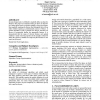844 search results - page 94 / 169 » Generalized crowding for genetic algorithms |
KBSE
2007
IEEE
15 years 4 months ago
2007
IEEE
Randomized testing has been shown to be an effective method for testing software units. However, the thoroughness of randomized unit testing varies widely according to the settin...
GECCO
2007
Springer
15 years 4 months ago
2007
Springer
In many design tasks it is difficult to explicitly define an objective function. This paper uses machine learning to derive an objective in a feature space based on selected examp...
GECCO
2007
Springer
15 years 4 months ago
2007
Springer
Computation in biology and in conventional computer architectures seem to share some features, yet many of their important characteristics are very different. To address this, [1]...
101
click to vote
GECCO
2005
Springer
15 years 3 months ago
2005
Springer
In neuroevolution, a genetic algorithm is used to evolve a neural network to perform a particular task. The standard approach is to evolve a population over a number of generation...
GECCO
2005
Springer
15 years 3 months ago
2005
Springer
In Genetic algorithms it is not easy to evaluate the confidence level in whether a GA run may have missed a complete area of good points, and whether the global optimum was found....

